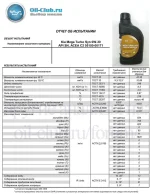Why choose the Euro Formula 5W30 over the XL 10W40? (Hope this is not too overwhelming)...
The Euro Formula has better base stocks than the XL, meaning it uses a higher proportion of Group 4 PAO & Group 5 ester in the mix than the XL's mostly Group 3/ 3+ blend. This causes Euro Formula (and Signature Series, SS) base oils to have a significantly higher natural viscosity index than XL. For EF & SS to be in the high 30 /low 40 weight categories, it will need significantly less viscosity index improver added to the base stock blend. Viscosity index improver is basically like short strands of rubber/ elastomer fiber that add viscosity to the fluid by unfurling to create flow resistance when its temperature increases. The presence of VII has always been thought of as a necessary evil in the multi-viscosity era (~ last 55 years) because it has a tradeoff. With mileage age comes oxidation, nitration, heat cycling (especially with turbos) , fuel dilution, and cylinder gas blow-by, all of which have a negative effect on motor oil, but most negative on the VII, which actually chemically react and turn into varnish, sludge, and carbon deposits. During this process of VII breakdown/ depletion, both the kinematic viscosity and the HTHS viscosity degrade, so an oil with lets say 2k miles will have lower kV100 and HTHSV values than virgin oil. This degradation process is what leads the smart formulators to start with higher kV100 & HTHSV levels to combine with lower quality base oils as a safeguard to attempt to maintain their viscosity properties within the range that the rating (ie. SAE xW40) requires, knowing serious degradation will occur, especially in a high performance engine used to its potential. But how much abuse can lower quality base oils endure before varnish, resin, sludge and carbon form inside the engine, or before enough VII has dropped out of suspension to indicate the oil is out of grade? To the operator/ maintainer's perspective the tradeoff will be more frequent oil changes to maintain the viscosity grade and cleanliness of the oil. In the end, the cost to go with the lower spec oil may not be the bargain it first appeared to be.
The approvals and recommendations also show this:
XL is recommended for API service SM, SN, SN+, SP and ACEA A3/B3, A3/B4 - which makes it a "high" SAPS oil, likely not catalytic converter/ warranty friendly. In fact, I'm not sure how it can simultaneously be SN, SN+, or SP and also A3/B3, A3/B4? Don't the API service >= "N" categories necessarily make it mid-SAPS?
European Formula 5W30 is approved for VW 504/507 and recommended for MB 229.51, BMW LL-04, Porsche C30, GM Dexos2, and Chrysler MS-11106. It should have a low or mid-SAPS level and the 5W- was likely to get the approval which will spec one viscosity grade for all climates, and should be perfectly fine for Florida. I live in north Florida and use 5W oil year-round, albeit on lower specific power output engines - less than 100hp/L.
You seem to be hung up on the dynamic viscosity rating of 40 vs 30 as well. At full operating temperature, the plain bearings in an engine only know the HTHS viscosity, which unfortunately is never marked on the container. While the XL has a 4.4 HTHSV and the EF has 3.6, two question marks pop up: do you need 4.6 because you're putting out 200 hp per liter (or will it just sap power output), and how long in use will it hold that value? Remember, all specs are allowed to be based on properties of brand new oil, and as I explained above it degrades during usage.
Also, to get a better idea of these oils' quality, compare the relative values of the approval specs on the Lubrizol spider charts.
In the end, running various oils in service and monitoring the wear level trends in used oil analysis (or even better, thru engine tear downs and inspection) will help you fine tune an oil selection that simultaneously has enough viscosity, and not too much viscosity, and can last thru the service interval without causing unintended consequences.


